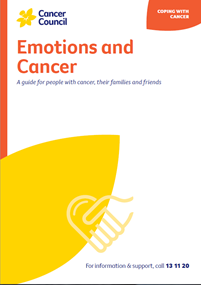- Home
- Cancer Information
- Managing side effects
- Sexuality, intimacy and cancer
- Overcoming specific challenges
- Sadness and depression
Sadness and depression
It’s natural to feel down during any stage of a cancer diagnosis. Changes to your body can be upsetting and it takes time to adjust. Some medicines and treatments can also affect your mood. Simple daily habits and the tips below may help improve how you feel.
Sometimes feelings of sadness become very strong, and start to affect other parts of your life, including sexuality. Talk to your treatment team if you are feeling more low than usual or if it persists.
How to deal with feelings of sadness and depression
Aim for a good night’s sleepPoor sleep can make depression worse, so try to get up and go to bed at the same time each day. Avoid long naps or caffeine after lunchtime. In the evening, swap screen-time – watching TV or using your phone/tablet – for relaxation exercises. If you wake to go to the toilet a lot, try drinking less at night or ask your doctor if there is anything that can help. | |
Add an activity to your dayGetting back into activities can lift your mood. You could make a list of things you enjoyed before cancer and try one a day. Plan a time for hobbies or talking to friends, instead of waiting until you feel “up to it”. You may need to adapt – if you can’t manage a book, try an audiobook. Focus on things that make you feel good (a fun movie), or in control (finishing a job you put off). Break tasks into steps if you feel overwhelmed. If you don’t get to it today, try again tomorrow. | |
Eat a balanced dietNutritious food can help to improve your energy levels, sexuality and sleeping patterns. If you find that you don’t feel like eating anything, try a small snack until your appetite returns. Try to drink enough fluids to stay hydrated – tea, water and low-sugar juices are good choices. Try to eat mostly healthy options with the odd treat. | |
Try regular exercisePhysical activity can help improve your mood, so be active if possible. Plan so exercise each day, but be kind to yourself if you can’t make it. Start slowly – if you can’t go for a walk, just be outside. Begin moving around, even if you’re not in the mood. You can always stop if you don’t feel up to it. A massage (if appropriate for your cancer type) may help you feel like being active again. | |
Ask about medicinesDepression is common if you have low levels of sex hormones or hormone changes. Ask your doctor if your medicine or treatment could also affect your mood, sleep or libido. If you have continued feelings of depression, talk to your doctor, as counselling or medicines – even for a short time – may help. Let them know if sex is important, as some antidepressants can affect sexual function. | |
Where to get more helpIf you worry that you, or someone you care for, may be depressed, you’ll find a checklist and helpful information by calling 1300 22 4636 or visiting Beyond Blue. For 24-hour crisis support, call Lifeline 13 11 14. You can also talk to your GP or your cancer care team. In an emergency call Triple Zero (000) or go to an emergency department. |
More resources
Dr Margaret McGrath, Head of Discipline: Occupational Therapy, Sydney School of Health Sciences, The University of Sydney, NSW; Yvette Adams, Consumer; Dr Kimberley Allison, Out with Cancer study, Western Sydney University, NSW; Andreea Ardeleanu, Mental Health Accredited Social Worker, Cancer Counselling Service, Canberra Health Service, ACT; Kate Barber, 13 11 20 Consultant, Cancer Council Victoria; Dr Kerrie Clover, Senior Clinical Psychologist, Psycho-Oncology Service, Calvary Mater Newcastle, NSW; Maree Grier, Senior Clinical Psychologist, Royal Brisbane and Women’s Hospital, QLD; Mark Jenkin, Consumer; Bronwyn Jennings, Gynaecology Oncology Clinical Nurse Consultant, Mater Health, QLD; Dr Rosalie Power, Out with Cancer study, Western Sydney University, NSW; Dr Margaret Redelman OAM, Medical Practitioner and Clinical Psychosexual Therapist, Sydney, NSW; Kerry Santoro, Prostate Cancer Specialist Nurse Consultant, Southern Adelaide Local Health Network, SA; Simone Sheridan, Sexual Health Nurse Consultant, Sexual Health Services – Austin Health, Royal Talbot Rehabilitation Centre, VIC; Prof Jane Ussher, Chair, Women’s Heath Psychology and Chief Investigator, Out with Cancer study, Western Sydney University, NSW; Paula Watt, Clinical Psychologist, WOMEN Centre, WA.
View the Cancer Council NSW editorial policy.
View all publications or call 13 11 20 for free printed copies.
Need to talk?
Support services
Coping with cancer?
Speak to a health professional or to someone who has been there, or find a support group or forum
Life after cancer treatment
Webinars, exercise and nutrition, sexuality programs, and back-to-work support
Cancer information
Your coping toolbox
Strategies for managing difficult situations during and after cancer treatment
View our publications
Guides and fact sheets for people with cancer, their families and friends

